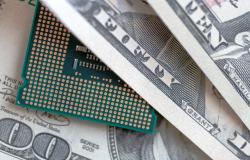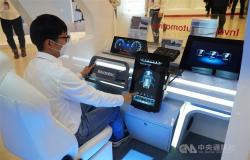Moore is best known for pioneering Moore’s Law, the observation that the number of transistors on an integrated circuit doubles every two years or so. But if Moore deserves credit for creating the law that drove the progress of the industry, it is Dutch company ASML, which makes the machines that in turn let manufacturers produce the most advanced computer chips in the world, that deserves much of the credit for ensuring that progress remains possible.
Yet that also means the pressure is on. ASML has to continue making sure chipmakers can keep pace with the law. Will that be possible? Read the full story.
—Mat Honan & James O’Donnell
Why Threads is suddenly popular in Taiwan
For most people around the world, Meta’s text-based social network Threads is a platform they likely haven’t thought about for months. But for Liu, a design professional in Taipei, it’s where she’s receiving unprecedented attention.
She’s not the only person feeling this surge of popularity. Threads has dominated app-store download charts in Taiwan for months. Prominent officials have set up accounts, and it’s become the most popular platform among young people. But Threads’ unexpected success on the island is complex, and precarious. Read the full story.
—Zeyi Yang
A conversation with OpenAI’s first artist in residence
Alex Reben’s work is often absurd, sometimes surreal: a mash-up of giant ears imagined by DALL-E and sculpted by hand out of marble; critical burns generated by ChatGPT that thumb the nose at AI art. But its message is relevant to everyone. Reben is interested in the roles humans play in a world filled with machines, and how those roles are changing.
Reben is OpenAI’s first artist in residence, and is also now director of technology and research at Stochastic Labs, a nonprofit incubator for artists and engineers in Berkeley, California. He spoke with our AI editor Will Douglas Heaven about the unresolved tension between art and technology, and the future of human creativity. Read the full interview.
It’s easy to tamper with watermarks from AI-generated text
The news: Watermarks for AI-generated text are easy to remove and can be stolen and copied, rendering them useless, researchers have found. They say these kinds of attacks discredit watermarks and can fool people into trusting text they shouldn’t.
Why it matters: Watermarking works by inserting hidden patterns into AI-generated text, which allow computers to detect that the text comes from an AI system. They’re a fairly new invention, but they have already become a popular (and, as it turns out, deeply flawed) solution for fighting AI-generated misinformation and plagiarism. Read the full story.
—Melissa Heikkilä
The must reads
I’ve combined the internet to find you today’s most fun/important/scary/fascinating stories about technology.
1 Google has agreed to delete billions of records
After a class action accused the company of misleading Incognito Mode users about how it tracked them. (NYT$)
+ The move could end up costing Google billions in additional lawsuits. (WP$)
+ It’s an exceptionally busy legal year for the tech giant. (WSJ$)
2 Brain cell transplants could help treat epilepsy
It’s early days, but it’s looking like a breakthrough for stem-cell technology. (MIT Technology Review)
3 The UK and US have signed an AI safety risk partnership
It outlines how to pool technical know-how, talent and other information. (FT$)
+ The countries will perform a joint testing exercise on a public AI model. (Reuters)
+ Do AI systems need to come with safety warnings? (MIT Technology Review)
4 The US is following South Korea to restrict chip exports to China
Officials in Seoul are mulling over the request ahead of the G7 summit in June. (Bloomberg$)
+ How to build a GPU with one trillion transistors. (IEEE Spectrum)
5 AI is making search engines dumber
And that’s a serious problem when we’re supposed to rely on them. (WP$)
+ Google DeepMind’s Demis Hassabis is fed up with AI grifting. (FT$)
+ OpenAI has deemed its own voice cloning tool too risky to release. (The Guardian)
+ Why you shouldn’t trust AI search engines. (MIT Technology Review)
6 The ability to repair your own car is under threat
-






